A MASSIVE MASS FOR THE MASSES
It’s a happening in Disney Hall. And there’s no better way to salute Leonard Bernstein in his hundredth year than a humongous and awesome presentation of his rarely produced Mass. How did a secular humanist Jewish composer come to write a a modernized interpretation of sacred Mass texts, including the “Kyrie eleison,” the “Agnus Dei,” and the “Gloria in excelsis deo”? Commissioned by Jacqueline Kennedy in memory of her assassinated husband, Bernstein composed his Mass to memorialize John F. Kennedy, America’s first Catholic president (the occasion was the grand opening of the John F. Kennedy Center for the Performing Arts in Washington, D.C. in 1971).
With interspersed English texts written along with Godspell and Wicked‘s Stephen Schwartz (whose name is strangely missing from the program credits), Bernstein chose the structure of the Roman Catholic Mass, but instead created a “Theatre Piece” regarding a Catholic Mass, complete with a celebrant who ultimately has a breakdown because of his inability to live up to what his followers demand of him.
And this is one of the most fascinating aspects about this uneven work — which is being given a must-see behemoth production by LA Phil that opened last night and plays through Sunday: Bernstein composed this massive Mass for a massive cast made up of dancers called “Acolytes” and three choruses — a formal choir, a children’s choir, and a group of adults called “Street Singers,” who we unfortunately don’t connect with emotionally because there isn’t a story.
Additionally, there’s an orchestra with organ, a rock band (which is here incorporated between string sections), and a marching band (played here by the UCLA Wind Ensemble stamping down the aisles) — all offering music styles that include Broadway, opera, rock ballads, blues, folk and atonal serialism (it’s as if Bernstein was commissioned to encapsulate the anxiety of the turbulent sixties). What he delivered is a sprawling, glorious mess of an un-liturgical Mass that inspires as much as confounds. Thus, Bernstein found himself not living up to what was expected of him.
(In his unfair review for The New York Times, Harold Schonberg disparaged it as “a combination of superficiality and pretentiousness, and the greatest mélange of styles since the ladies’ magazine recipe for steak fried in peanut butter and marshmallow sauce.” Howard Klein’s take in the same paper is more accurate: “The piece is pure Bernstein … audacious, brilliant, excessive, self-indulgent, sentimental, touching, a cornucopia of genius poured out with no restraint.”)
The piece may be higgledy-piggledy, but luckily the Los Angeles Philharmonic brought in director Elkhanah Pulitzer, who wisely created a stunning theatrical happening which — aided by choreographer Laurel Jenkins’ ecstatic, be-in-style movement and her dancer’s participatory gesticulations — is a mash-up of a mega-church sermon and a production of Hair.
With tricky amplification causing inconsistent acoustics, there is some credence to Bernstein’s assertion that Mass “could not conceivably be done in a concert hall,” but conductor Gustavo Dudamel controls the proceedings magnificently (and the supertitles are indispensable). Equally worthy of praise are the Los Angeles Master Chorale and its leader Grant Gershon and the Los Angeles Children’s Chorus under Anne Tomlinson (the finale “Pax: Communion,” highlighting the silver-toned boy soprano Soran Ryssdal, is exquisite).
The LSD trip is further beautified by set designer Seth Reiser’s towering altar, with a cross made up of two LED-light-changing strips, and Adam Larsen’s hallucinatory projections. One particularly stunning stage picture had the chorus — sitting in the bleacher seats on either side of the stage’s organ — lit by their hymnals, while the stage is radiating red, and flames waft around the crucifix (Reiser also designed the lights). And while she isn’t credited for those amazing wigs — from beatnik to afro — costumer Christine Crook made the Summer of Love entirely palpable. There is an imbalance of sound levels, yet designer Mark Grey really has to be commended for handling over 240 performers and instrumentalists and pre-recorded quadraphonic sound.
Looking a little like John Voight in Midnight Cowboy, the superb bass-baritone Ryan McKinny (who played the title role in Nixon in China), elicits pathos with his combination of strength and vulnerability, in both posture and voice. The 16-member street chorus rocked the house, with notable solos from soprano Laura Bohn, baritone Hadleigh Adams, mezzo-soprano Zanda Å vÄ“de, Jason Gotay, and Matthew Hydzik. Phillip Brandon didn’t have a lot of soloing work, but got the biggest applause just for his joyful presence.
Yes, it’s a strange piece — visceral, exuberant, pompous, and dated (in sound, not themes) — but it’s a one-of-a-kind maverick which is thrilling to see live. When everything came together, as in the first act closer, “God Said,” I couldn’t imagine being anywhere else on the planet. It’s also a celebration of Bernstein, who — writing this work under major deadline pressure — gave us an epic plea for peace and love.
photos by Craig Mathew / Mathew Imaging (click on image for larger version)
Los Angeles Philharmonic
Gustavo Dudamel, conductor
BERNSTEIN: Mass
Walt Disney Concert Hall
ends on February 4, 2018
for tickets, call 323.850.2000 or visit LA Phil
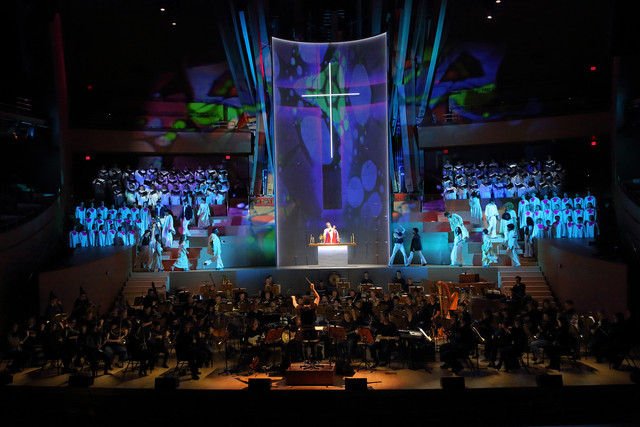
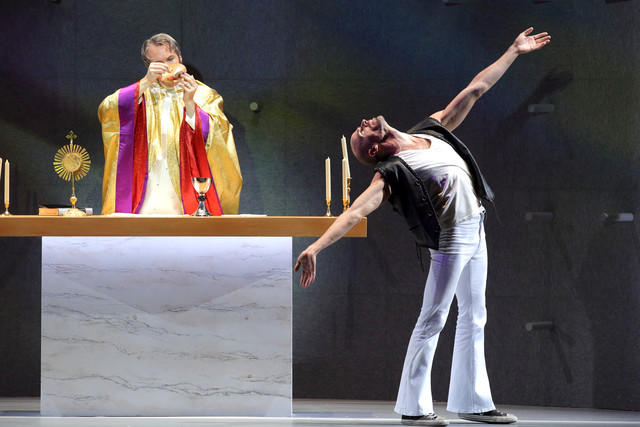

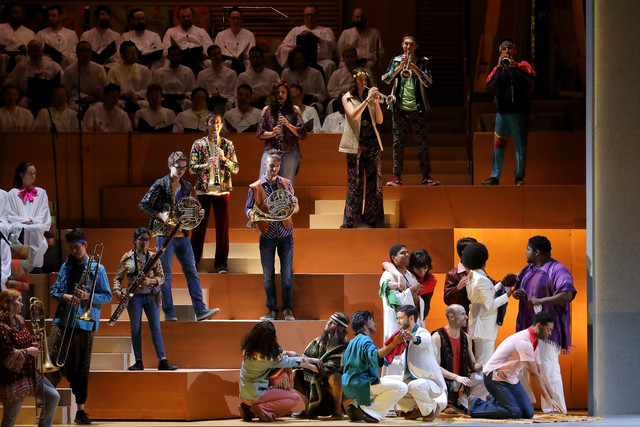
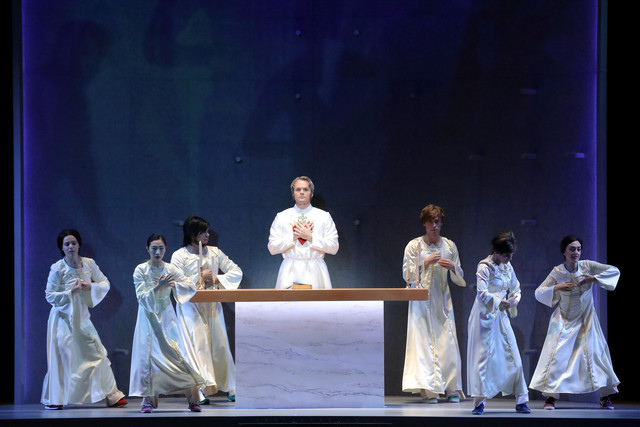
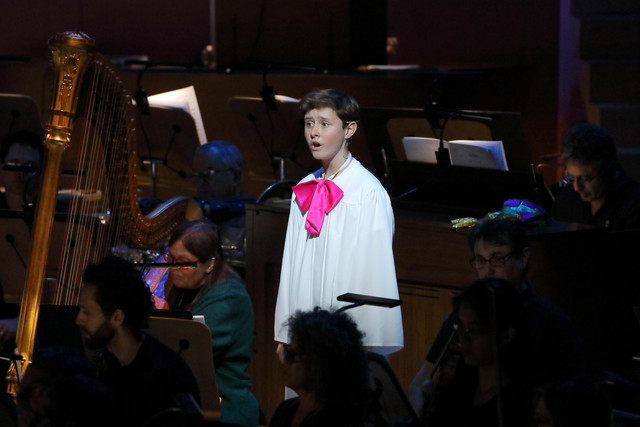
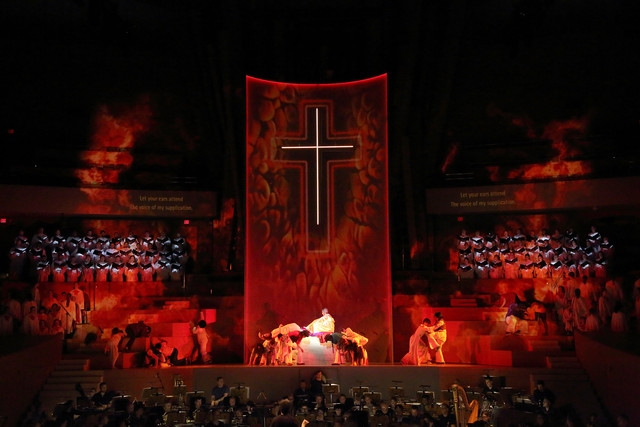
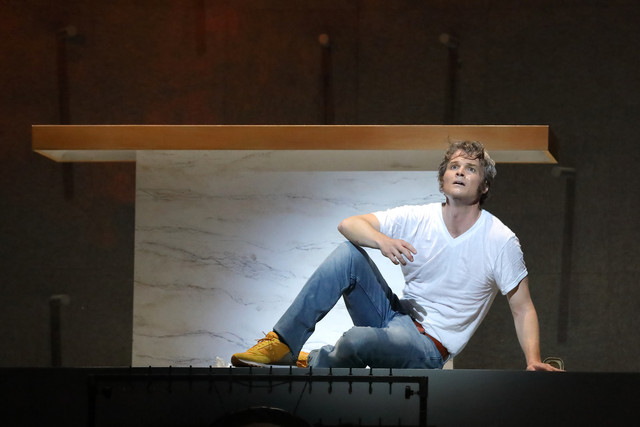
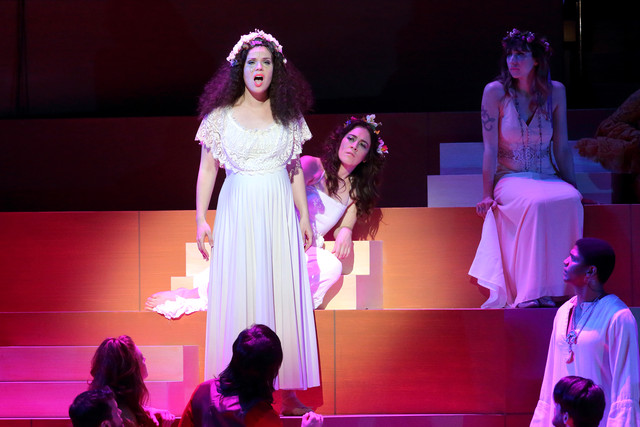
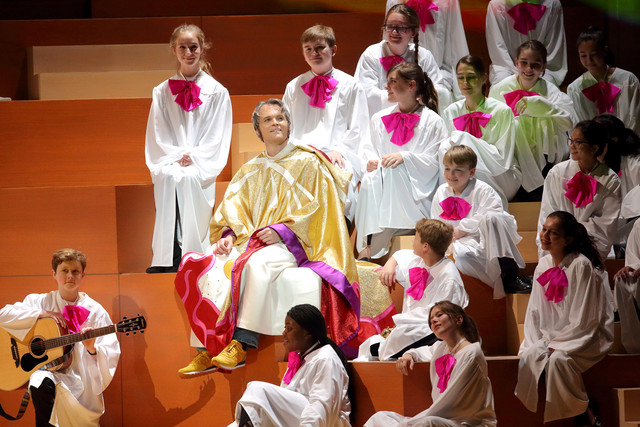

{ 2 comments… read them below or add one }
Unbelievably beautiful!
Looks like a magnificent production! You were lucky to experience it!